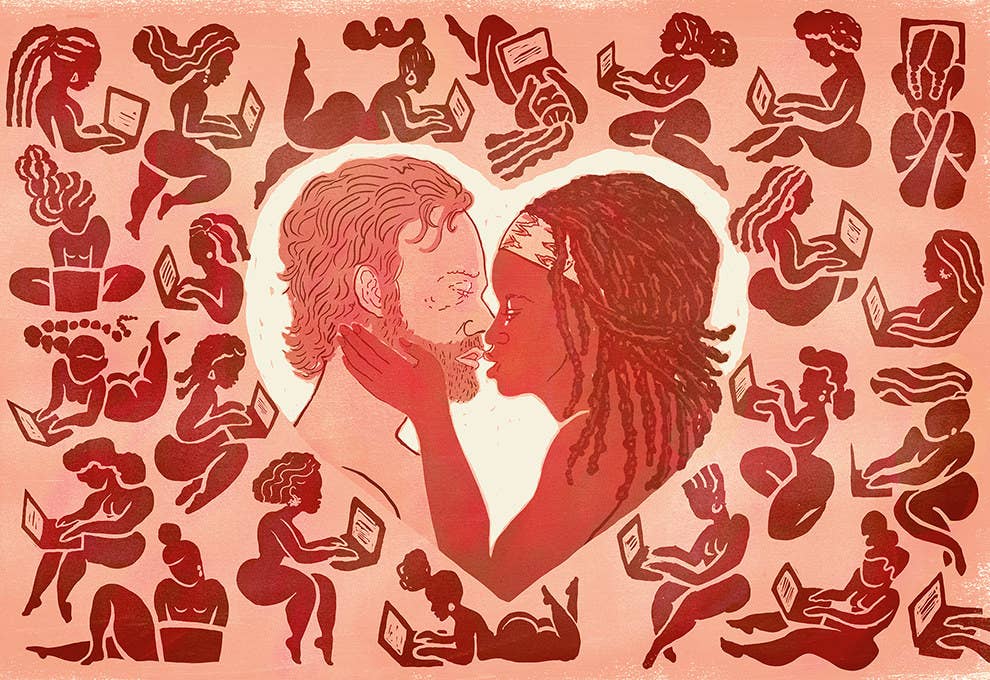
In “The Next World”, the 10th episode of the sixth season of AMC’s post-apocalyptic horror drama The Walking Dead, showrunner Scott M. Gimple gave those of us who had been waiting for three long seasons all we have ever wanted. In the episode, characters Rick (played by Andrew Lincoln) and Michonne (Danai Gurira) sat on a sofa laughing over a pack of breath mints. Still smiling, with their hands entwined, they leaned towards each other, and kissed.
Finally, we breathed, overdramatically, as “Richonne” was made canon (to the chagrin of a subsection of the show’s fans). GIFs of the moments leading up to and after the kiss arrived on Tumblr almost instantaneously. On YouTube, ecstatic fans posted reaction videos, shock and delight written into their expressions. And slowly but surely, the fanfiction engine rooms for the good ship Richonne cranked up to propel fans to dizzying new heights. Two days after the episode aired, I logged on to fanfiction.net (and Archive of Our Own) for the first time in years, and gorged on all the Michonne fanfic I’d (clearly) been hungering for. Almost all lapsed productions surged back to life with new chapters; reinvigorated by the passionate and tender lip lock, the muse was in a purple patch again, and new fics (shorthand for fanfiction stories) sprung up with frightening haste. It had only taken a kiss in a zombie apocalypse.
That kiss would go on to be reimagined, over and over and over again, with writers taking on all sorts of literary devices to flesh out that two-minute scene and what followed into literally millions of words.
Fanfiction as a byproduct of one art form (a TV show, a book, a film, and so on) is perhaps one of the purest “consequences” in pop culture: While Star Trek fanfic is the modern jump-off point for modern analyses (and Kirk/Spock remains the gold standard of slashfic, i.e. fanfiction with characters of the same sex), it existed in decades prior. Its purpose is simple: If you love it, write (more of) it. Necessarily derivative, it is nevertheless a distinct art form in its own right, and interestingly, it is a movement overwhelmingly crewed by women.
Fanfiction’s function as a creative outlet – as pleasure for pleasure’s sake – is the one unchanging feature of the art form. Modern fanfic writers do it because they are among the savviest of pop culture consumers out there: They understand the tropes, the constraints, and even the industry process. These writers exist to broaden and further furnish the universes of their fandoms.
This moment feels like a feverish high point of expanded diversity on screen: People of colour (and black women in particular) have been enjoying an increase in both visibility and variety on television. It makes sense that the explosion of (Richonne) joy that catapulted me back into the waters of fanfiction coincides with an explosion in fanfiction starring black female characters and written by black women. But we are still dealing in partially built worlds – even the likes of Shonda, Issa, and Michaela Coel (in the UK) can only do so much – so it is still up to black fangirls to build up the remaining parts of their missing worlds (and the characters who inhabit them) in fanfiction.
In these stories, black women get to be more than just platonic friends and trusted advisers. They are more than just cogs in the wheel to keep the story moving, and they get to sin and come back from it, with rich and complex redemption arcs. They also get to be playful and fun, and flawed. Importantly, they also get to self-define their sexiness, and are uncomplicatedly desired without harking to either hyper- or de-sexualisation. In these small ways, fanfiction (especially as written by black women and girls) is the perfect vessel to advance the much-needed view that black women’s lives are more complex than films and television would have us believe. In the larger picture, these fics are acts of radical self-love and self-determination.
After years of lurking in the shadows, the ugly, slightly feral stepchild of fandom, fanfiction is slowly emerging into the light of the mainstream. Whether or not fanfic has influenced the mainstream depictions of certain characters, that so many black women are choosing to create work in the space is an interesting phenomenon in itself. These black women are finally getting to write the stories they’ve wanted to see for years.
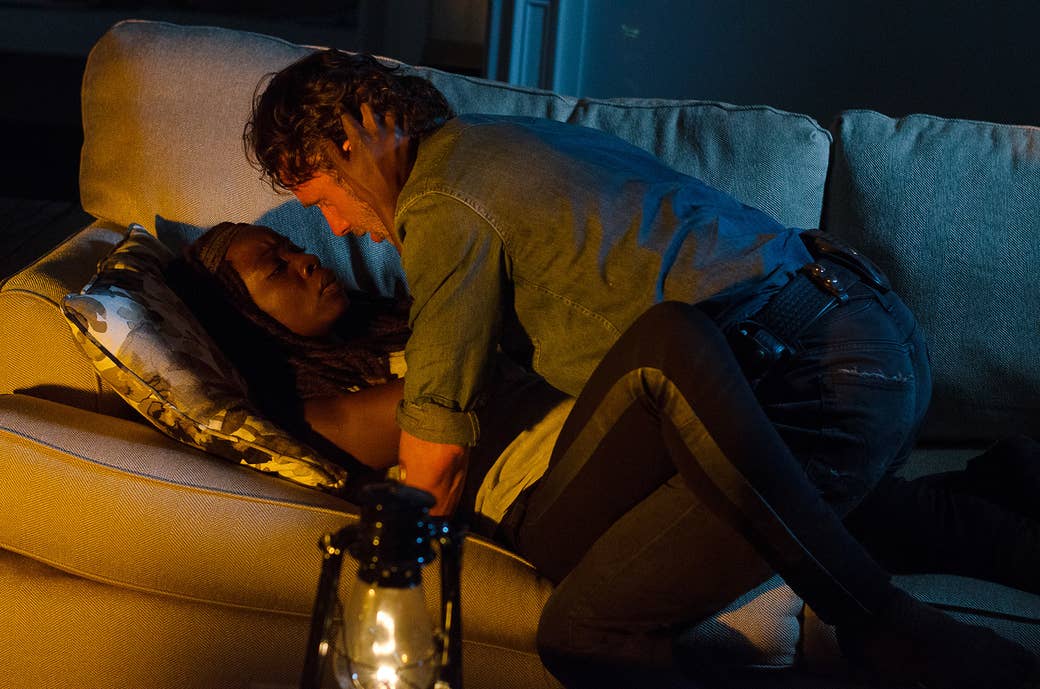
In both professional and personal capacities, I am a fan. And watching a TV show can be the starting point for discovery. For example, watching a show will almost always send me on a journey to collect the references contained in it, which in turn will lead me to new art forms, on different platforms. As well as living in its own specific moment, the way a show is consumed is also shaped by what came before it, what it lives alongside, and what it spawns. In that way, it is arguable that fanfic is a necessary and huge part of that conversation – its presence in a fandom sort of “legitimises” it as a solid cultural product.
I was imagining versions of fanfic long before I began reading it or even knew it existed, and chances are you were too; all I knew was that I wanted more stories of Rowena and Ivanhoe, of Dempsey and Makepeace, of Lotor and Allura (that was ~problematic~ then, and remains so now). By the time I actually began reading fanfic (god bless Angela from Boy Meets World, and Joey from Dawson’s Creek), I was already well versed in it. And once I knew what I liked, off I went looking for it.
We may not live in a television utopia now, but the options have increased exponentially since the earliest days of recorded fanfic.
If you think about fandom as a numbers game (which it very often is), television was for many years completely awful when it came to characters of color: There weren’t very many of them, certainly not in lead or even co-lead position, and the few who did make it onto the screen just weren’t being given the kinds of interesting roles that compel fans to create spin-offs at the same rates as their white counterparts. We may not live in a television utopia now, but the options have increased exponentially since the earliest days of recorded fanfic. By virtue of the simple fact that we have never had this many black women on TV, it stands to reason that there are more fics out there with a black female character in the lead than at any other point in history. And it is with that in mind that I have made an executive decision regarding my fanfic consumption: Unlike much of my pop culture interests, the only fanfiction I will actively seek out and read are fics with black female lead characters.
The first black-girl-led fanfic I ever read was about Angela Moore from Boy Meets World, back in the late '90s. The stories, probably written by black girls who, like me, who were jonesing for a spin-off with a title like Angela Leaves These Basic White People Behind and Flourishes tipped me from casual viewer to full fan. In between occasional dips into Dawson’s Creek fanfic (I still love you, Joey) and stories from the Buffy the Vampire Slayer universe, I remain drawn first and foremost to stories starring black female characters. The habit continues to this day, from Martha Jones (Doctor Who) to Abbie Mills (Sleepy Hollow) to Iris West (The Flash). And, of course, Michonne. And while there are all sorts of people who write fanfic that features these women’s lives front and centre, I am particularly interested in those stories when they are written by black women.
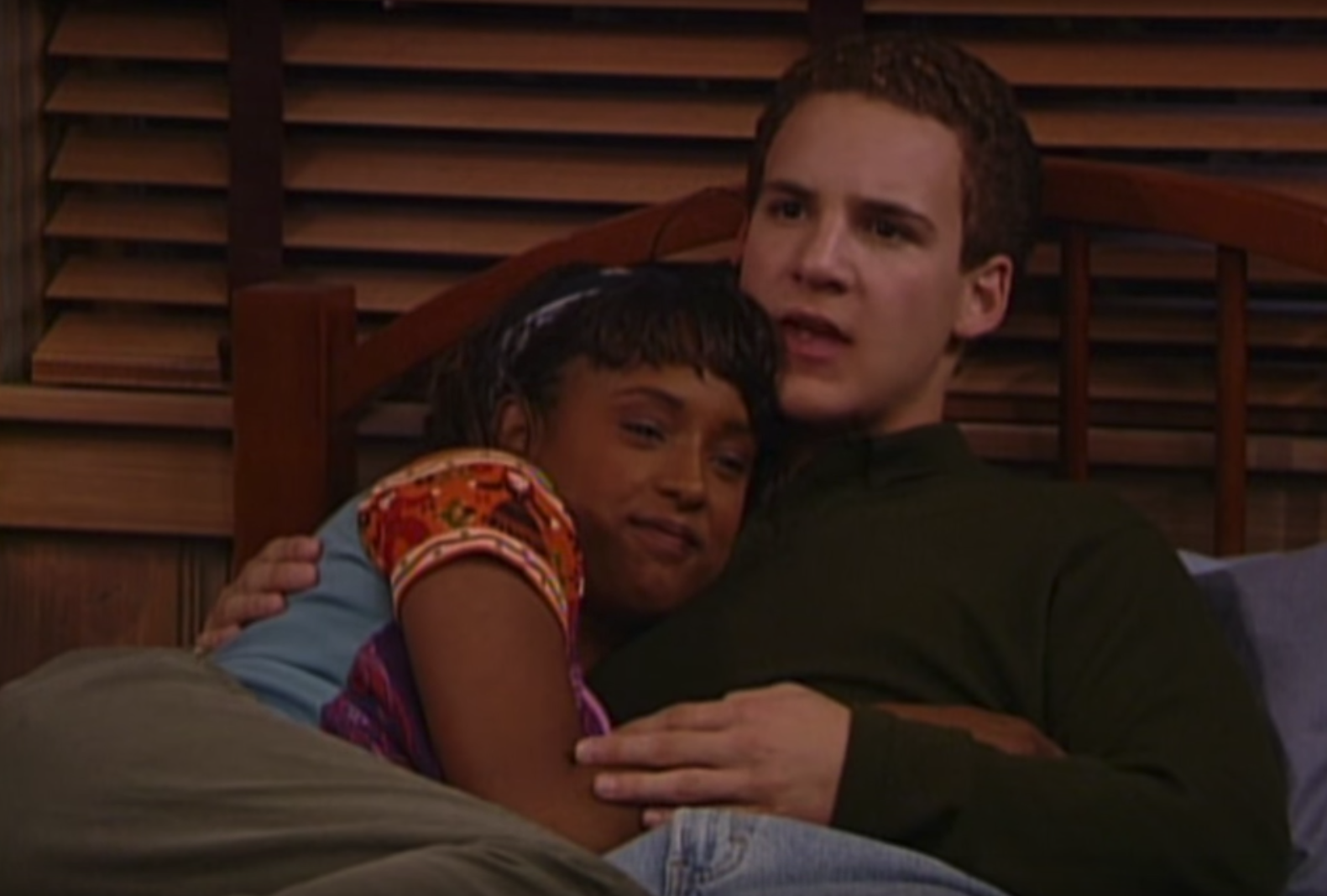
For Ashley Jordan, a thirtysomething writer from Atlanta, the decision to write fanfiction with Michonne as her star was a no-brainer. She was a latecomer to The Walking Dead, beginning to watch shortly after Michonne’s first appearance at the end of the second season. “I can't even really think of another character on TV that looks so much like me, quite honestly,” she said when we spoke on the phone. Ash or Cake (as she is known to her fans on Tumblr; her fanfiction.net username is “cakebythepound”) is one of my favourite fic writers in the fandom. “I mean, when she walked up to the screen, this dark-skinned woman with dreadlocks and big lips, I was like, Wait! who is this? Hold on! I couldn't believe she was like a real, regular character. I thought maybe they were gonna kill her really quick. I knew that I needed her to stay forever.” After the show went on its summer hiatus at the end of the fourth season, Ash knew what she had to do. “That was when Rick and Michonne really got going. Basically, I was like, I need more,” she said, laughing. She’d never read any fanfiction, but she’d heard of it, back in high school. A Google search for “richonne fanfiction” sent her to Tumblr, which redirected her to fanfiction.net. “There wasn't much there, not enough to keep me going all summer. So I'm like, I'm gonna write my own story [laughs]. And that's where it started.”
Three years after Ash first logged on to fanfiction.net, her landing page now lists 32 stories written for The Walking Dead. Her most read, Lemonade, was written over five months this summer, has a word count of 99,955, 225 “favs” and more than 1,000 reader reviews – that’s a novel-length work, with the type of reader engagement many professional authors would kill for. In fanfiction, Ash is a rock star. Lemonade’s story is a mashup: a Richonne drama loosely based on the 2016 Beyoncé album of the same name. Its themes cover much the same ground, i.e. a woman in a long-term relationship dealing with heartbreak, motherhood, an unfaithful spouse, self-discovery, and ultimately the redemptive power of love.
Ash is meticulous about her craft. Creating newly imagined, nuanced backstories (and new scenarios) for these characters is a point of pride and the result of careful planning and thought. “Generally I do an outline of the whole story from start to finish,” said Ash. “I don't have a lot of time, so when I sit down to write I need to know what I'm going to write.” The response to Lemonade has overwhelmed its author – by the time she posted the second chapter of the 18-part story, she was receiving about four times the usual number of reviews for her fics. “It was kind of scary, honestly,” she said. “But the comments are the best part. They are what make my day.” The praise is near-unanimous: “OK. You have a gift. The gift,” reads one, posted days after she uploaded the first chapter. “I have a feeling this story is going to wreck me,” says another. But I’m so ready.” Her readers reach out to her with questions and sometimes requests for her to help clarify their thoughts on pop culture stuff, both within her writing and fandom at large. It would be easy to dismiss Ash’s influence as something confined to uber-fan spaces like Tumblr or AO3. But it extends beyond, to very mainstream platforms like Twitter. When I casually mentioned being interested in Richonne recently, a follower sent me an unsolicited recommendation swiftly: “lemonade by cakebythepound ok byeee,” she tweeted.
Lemonade is up there with the best fiction I’ve read in 2016. I read it in the same way I devoured Colson Whitehead’s The Underground Railroad and Imbolo Mbue’s Behold the Dreamers. I would pay money for Ash’s work, the same way I bought paperbacks by Danzy Senna and Madeleine L’Engle from the bookstore this year. And based on the comments from her readers, I am not alone.
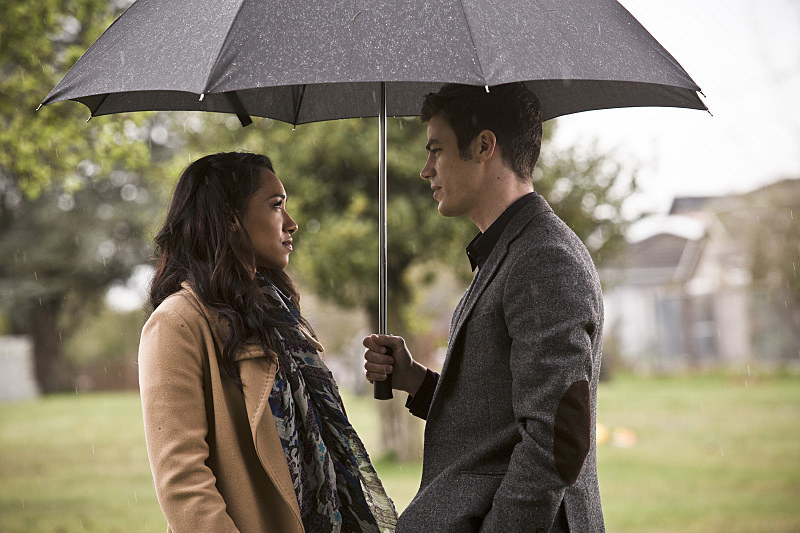
Authenticity is currency in the world of fanfiction. The greatest compliment I can bestow on a fic writer is to tell them that the characters in their story felt like they were in their original universe. And even when they step out of that official canon – a story in which we follow the teen versions of a set of characters, for example – they need to be recognisably themselves. The best fic writers do not need to work in the writers room of their favourite shows – but need to read as if they do. I can forgive a somewhat poorly written fic if it is clear to me that the writer knows the characters inside out.
Richonne is one of a handful of my all-time OTPs (“one true pairing”, aka one I direct the bulk of my emotional bandwidth to). I can think of no finer couple in this particular fandom. I have read more than 100 Michonne-centric fics over the last few years: That means I’ve read more than a hundred synopses of this type of meta-fiction (including the misleading, the spot-on, the dry, or the wildly oversold); I have swallowed the same fic tropes (enemies become lovers!, “There is only one bed”, high school AU, i.e. alternate universe, and so on); and I have traversed multiple AUs, all to experience the pleasure of worlds of words built around my favoured fictional characters.
The type of fanfic I personally love to read is fluff or smut (more on that later) but I will even read the angsty stuff, if I am being carried along at a brisk clip. I dish out kudos to the stories that transport me, whether over a one-shot or 37 long chapters. And if a fic writer presents me with a challenging story, plot-wise, I will award them a mental gold star.
Choosing to create intricate, nuanced narratives that centre on the perspectives of black female characters is a deliberate choice.
New York-based writer Kendra Jones’s most active fandom is The Walking Dead, but the 33-year-old has also written fics in fandoms as diverse as Doctor Who, Scandal, and Sleepy Hollow, many of which live on fanfiction.net under her username, kendrawriter33. The first fic she ever wrote was in the Harry Potter universe, but she had no idea what fanfic even was – until she started writing it. “One of my first assignments [at college] was to read the first Harry Potter book and turn it into an adapted screenplay. Long story short, I fell in love with the story, and I found myself compelled to write down things that had nothing to do with what I was actually supposed to be putting on paper. I could not stop picturing the character saying and doing things that had nothing to do with what the author had written,” she said. Her friends told her to try fanfiction.net. “I just fell in love.” Her first story centered on a black girl. “It was a story about Harry and Angelina Johnson, a character that no one gave a crap about. She was the only black female character in that book, that I was like, ‘YES, SHE IS ME AND I AM HER.’ And so I wrote a love story.”
There is an element of defiance to the stories that she writes. Choosing to create intricate, nuanced narratives that centre on the perspectives of black female characters is a deliberate choice. “I've always loved books and stories and movies but there's no representation for a girl like me: I'm a nerdy black girl who grew up obsessed with fantasy and grand love stories and, you know, all kinds of genre stuff where you just don't see a lot of characters of colour – particularly not women of colour – represented,” she said. “There's so many interesting, wonderful, nuanced stories about white people out there, floating around the universe, and we don't get those. So we have to make them ourselves, essentially.”
Tamara, a 37-year-old fic writer from Texas, started out writing fanfiction starring The X-Files’ Mulder and Scully. She put down her pen for about a decade, and was only moved to pick it back up when television gifted her the perfect protagonist: Scandal’s Olivia Pope. “I think because it was a black woman starring in the show, and a show produced by a black woman,” she said. “It was inspirational. If Shonda Rhimes can write this, I can write too.” As blacklitchick on FF and AO3, Tamara has since turned her hand to – yup, you guessed it – The Walking Dead, and Michonne. “There’s no other character on TV like her. She has so many layers. Of course she’s strong, but there are all these other things. And Danai is such a great actress – again, she makes me want to write.”

Of course, the character of Michonne is many things besides a black woman: she has a painful past that influences much of her present behaviour; she is a skilled and brave fighter with a head for strategy; she is a compassionate friend and a level-headed influence on Rick and the band of survivors that make up “Team Family” in TWD. So the right to write fics about her does not belong exclusively to black women. But there is no escaping the fact that she lives in the world as a black woman, and a topic that comes up every time I’m discussing favourite fics is the creator question: Can you tell when the fic writer is not black? I have pretty good “blackdar” on this, and so do some fic writers and readers. It’s almost always tiny details, both concrete and intangible – for example, the contrast in the overarching kindnesses offered to nonblack vs. black characters. For Kendra, this was striking in the Doctor Who fandom, in the way many writers imagined Rose Tyler (the 10th Doctor’s white companion) and Martha Jones (Ten’s black companion). “I noticed I could tell who was writing it by the way that they treated Rose versus Martha,” she said. “A lot of the time, [writers would] give Rose the benefit of the doubt.” This was not the case for Martha. The lack of generosity to black characters also manifested even more explicitly: a resistance in some quarters to explore a romantic connection between Martha and Ten, a relationship many fic writers were happy to write for other Companions. (See also: Mercedes and Sam on Glee, Carter and Reese on Person of Interest, Bonnie and Damon on The Vampire Diaries, and even Uhura and Spock in the 2009 Star Trek reboot. The list goes on.) There is something to be said about the fact that all these black characters have been paired with white men; In her essay, When White Men Love Black Women on TV, Tressie McMillan Cottom addresses it by saying, “…it is disingenuous to argue that power dynamics of representation and even economics do not influence with whom we mate.”
To give Michonne a surname is to confer dignity to the character.
Another giveaway is the language of the descriptors used for Michonne’s physical features. Calling her hair “dreads” instead of “locs”, for example, pulls me up short. When a writer chooses to describe her lips as “thick” over “full”, a tiny alarm goes off. When a writer marvels, over and over, at the contrast between the colour of her skin and Rick’s, a feeling of mild unease settles in my stomach. These things rarely read as malicious, but they betray a shallow intimacy with the reality of a black woman’s lived experience (a similar tone-deafness comes from all-white writers' rooms). Getting the essence of Michonne, for example, means understanding the reality of her existence as a black woman (even in the midst of a herd of walkers). “In my mind, I am Michonne, she is me,” Kendra said, laughing.
On a recent episode of The Flash on The CW, Iris looks into a mirror and asks, in a tone seeking reassurance, “Does my butt look big in this?” Of course, not all black women want a larger derriere, but to my ears, the line rang false. One fic-reading friend counts how many times Olivia Pope or Martha Jones steps into a shower with no shower cap; another notes every time Iris pulls on a silk scarf before bed. Details matter. For Michonne, one of the most pressing details is her (lack of a) surname.
Miller. Matthews. Morris. Away from the childish pleasure of alliteration they go with names like Logan, Parker, or Richardson – no doubt a thorough internet trawl would yield a surname for every letter of the alphabet. In fanfiction, Michonne is given myriad backgrounds, with names to match. A good number of those surnames have been given to her by other black women. They give her all sorts of different monikers (Haitian, French, Scottish, or Spanish), because like so many black women in pop culture, someone only thought to give her half.
To give Michonne a surname is to confer dignity to the character. “Yeah, that's very important,” said Ash. “I think it's definitely something that a lot of black women really notice.” Kendra agrees. “I feel like people give Michonne a last name because it's the least we can do. She deserves that kind of respect.” She has worked the reveal of Michonne’s last name into a couple of her fics: In one, it’s Lindani, a Zimbabwean name, in homage to Gurira’s own heritage. She writes the disclosure as an act of postcoital intimacy between Michonne and Rick. “If you only have one name, like, where is the other half of that story?” she asked. “If you have Rick falling in love with her, why wouldn't he want to know her name?
“Why wouldn't he want to know everything he possibly could about her?”
All that talk of falling in love brings us to another huge part of fanfic – all that sex, aka smut. Fanfiction’s reputation as a landing spot for cheap thrills is sort of well earned, and fics starring black female characters are no exception. As is customary in fanfic, canonically straight (or sexually ambiguous) characters are sometimes re-imagined queer, and some fics choose to have them in polyamorous relationships. It’s also interesting to note which sexual powers are assigned to whom in various ships. (In The Flash fanfic, Barry is almost always inexperienced, with Iris as sexual aggressor, for example, and I’ve read at least two Spock/Uhura fics in which poor Vulcan Spock has to be schooled in the human love arts.) Like all things, the quality of the smut varies over time, from fandom to fandom, and from ship to ship. No one wants to be memorable for the wrong reason, and lord knows, good, actually erotic sex scenes are notoriously tough to write. But still, they come.
Ash cannot fathom a world in which she would write Richonne fanfic without sex, and it is as much a pleasure thing as it is a political one, especially because there was (and remains) a faction of TWD fans who could not – and still cannot – bear the idea of pairing Michonne with Rick. “Oh my god, my Tumblr was filled with anonymous people telling me that Rick didn't like Michonne, that he ‘didn't like black women,’ all kinds of nonsense,” she said. “And I was like, ‘OK, well, here's something for you – I'm going to write about Rick and Michonne fucking in front of Jessie [a brief romantic prospect for Rick in the sixth season], how about that?’” She laughed. “It drove me a little bit crazy.”
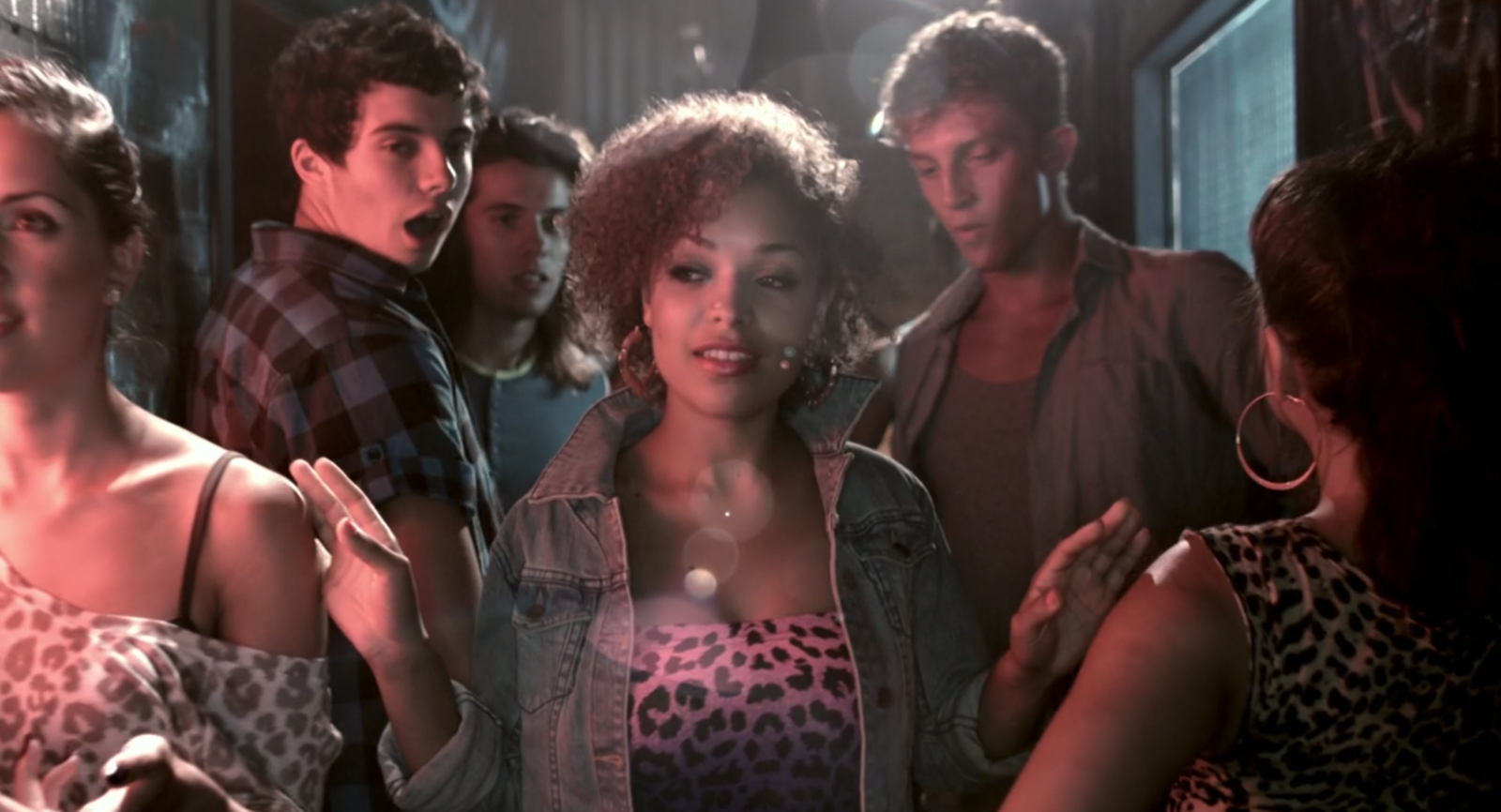
“The black girl doesn't have to be the friend – there are plenty of friends to go around,” she said, tongue planted firmly in cheek. “[Smut] is something I kind of always want to do. I just feel like that should be part of Michonne’s story. She's not just there to be his weapon or his best friend. It's the desexualisation of black women, and not seeing them as full people, I think. It's frustrating. Whether with Rick or someone else, she deserves to be loved. They're in the apocalypse – they should be having sex all the time!” she said, laughing again.
Thumbing their noses at strident anti-Richonners was at least a part of drawing up stories that explored the closeness between the couple. For Kendra, it was also about creating a narrative in which a black female character is desired with no reservations. “In my eyes, Rick and Michonne are perfect for each other. And seeing so many people reject Michonne as a partner for Rick for all kinds of ridiculous, nonsensical reasons was hurtful,” she said. “Michonne absolutely deserves that and vice versa: She's a bad bitch too! So I wanted to explore this deep, instant connection I saw on the screen. I had to get out all of the emotions and stuff that I was feeling when I was watching them and just explore what kind of relationship they could have if we were allowed to be vulnerable, if we were allowed to be sexy on our terms, if we were allowed to be supported and worshipped and loved by someone that we love. Which doesn't often happen for us in the media. I just had to do it.”
The “commerce versus art” discussion inevitably comes up with creative work, and in fanfic’s case, not least because of basic copyright laws. Fanfic writers are quick to point out they do not own the characters, that they make no money off of it, and that what they are doing is purely for love. Perhaps that’s just as well; their chances, as women, and as black women specifically, are not that great. TV writers rooms might be at their least homogenous ever right now, but we are still largely talking about pretty white, pretty male spaces. Behind the scenes (and in front of them), issues of access and opportunity still haven’t caught up with the diversity of actual audiences.
Behind the scenes (and in front of them), issues of access and opportunity still haven't caught up with the diversity of actual audiences.
For fic writers, one comment in particular garners a specific pleasure: when readers tell them a fic felt like it could’ve been an episode of the show. The obvious question to ask, then, is whether these women would like to end up writing for real for these shows. Is that the ultimate goal? Kendra, a writer in her day job, is interested but not banking on it. “I am a storyteller and I'm never just satisfied with what I see on screen. The only way to get more is to produce it myself. Which is a lot easier in fanfiction land than going to AMC Studios or Fox Studios or Universal and saying, "Hey – I have a script! Take a chance!" It's just a really easy outlet for me to tell the story that I want to tell.” For Tamara, an aspiring writer, the thought of being in the TWD writers room has crossed her mind, inspired by the likes of black women creators like Issa Rae and Shonda Rhimes. “I think people see it as a gateway to a writing career, almost. [Fanfic] is not as taboo as it used to be. I wouldn’t be surprised if Scott Gimple read some fanfic,” she said.
It makes sense that black women in particular, for so long ill-served by the very fandoms they love, understand pop culture with a keenness that informs the fanfiction they produce. “I really do believe that, especially with fanfiction written by people of color, it is a true reflection of everything that we need to see, and that we are yearning for, and that we are not getting,” said Kendra, citing Outsiders, Once Upon a Time, and Sleepy Hollow fanfic. “It's not just, ‘Oh, I have an idea for a story!’ No. I need to get this out, because everything that I'm watching is making me feel this way and I wish that there was some way that I could see it reflected back at me. Kudos to Gimple for making the common-sense decision about [Rick and Michonne’s] relationship, but frankly, they're a bunch of white dudes. They don’t know!”
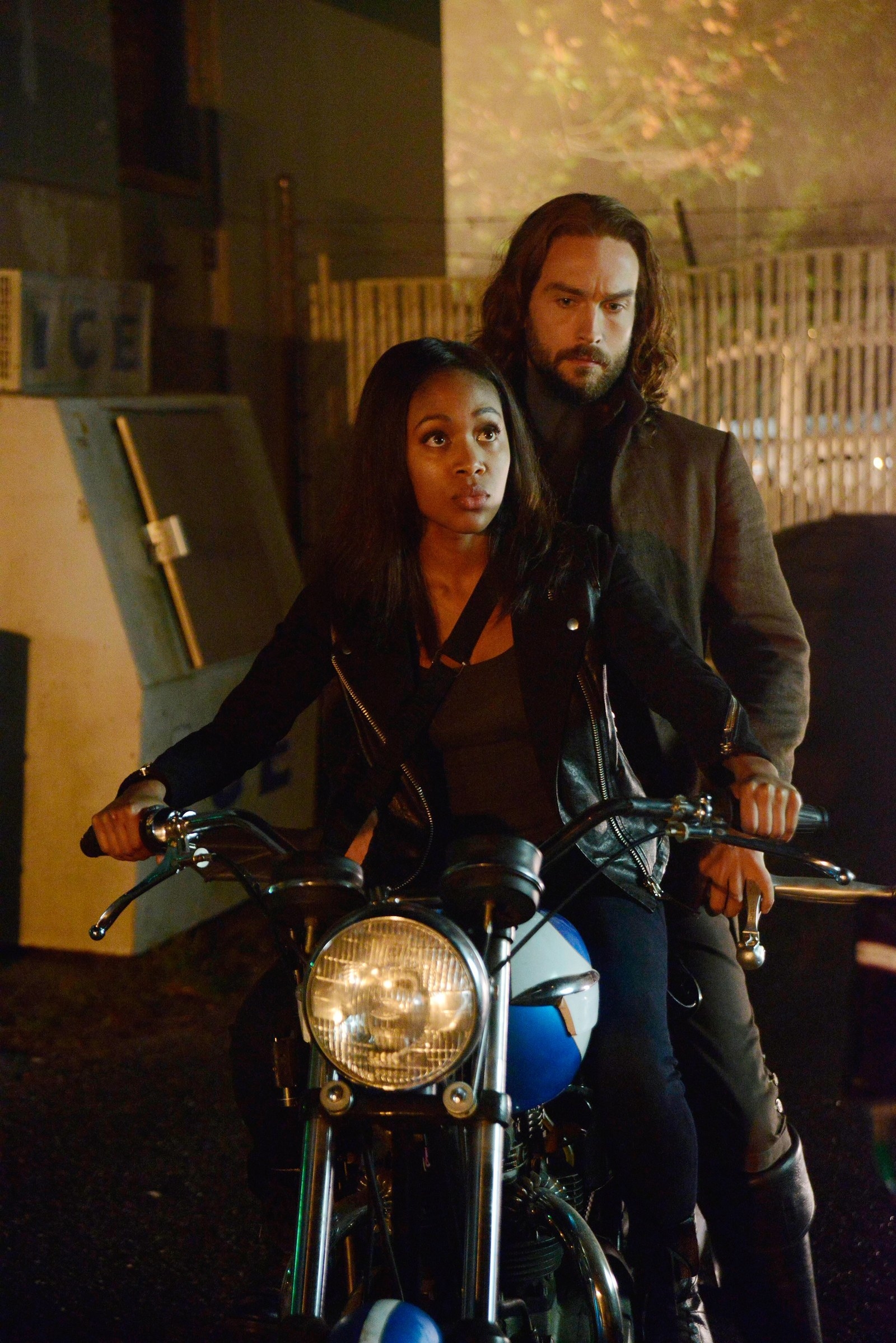
Ash agrees. “I think the biggest thing is that we get to expand these worlds that we kind of live in for a few months a year,” she said. “We want to add more to this story. Because, you know, it's a bunch of white men in a room, writing for this woman. I don't know that they even have the capacity to get it completely right, even though they did create this character that I love. There's still so many other places that you can go with her that they haven't. And so that's why we exist, it's to try to take her there.”
But what good is all this worldbuilding black fic writers are doing, if the source material remains just as flawed and continues to fail certain groups? It’s all a slow walk towards progress, reckons Ash, and the stigma of writing and reading fanfic has declined massively in recent years. When she first got into The Walking Dead, there were very few fics out there. Post the Richonne kiss, she witnessed an explosion. “It used to be something that I didn't tell anyone about. I didn't even post about it on my Twitter, and now I'm like, ‘Yeah, I wrote this – read it!’ Most of my Tumblr people – the people that I follow, the people who follow me – are black women. And it's really exciting to see black girls writing. We're all kinda doing the same thing and standing arm in arm and being these big nerds. It's really fun [laughs] and I love it. It's good.”
Kendra is similarly energised by fanfic breaking the surface. “I used to be very secretive about the fact that I write fanfiction. It used to be hidden in the shadows and I think people are becoming more and more aware. There are some really great, talented, amazing writers. I don't think it's anything to be ashamed of.” She paused. “I think J.J. Abrams is a fanfiction writer. He just happens to have a big-ass budget and some A-list actors. We just don't get paid for it.” But she hopes that will change soon. “I hope the abundance of such quality storytellers in fandom will eventually lead to more opportunities for writers of color,” she said. “I hope that collectively we start to realise our own talent is transferable – and more of us eventually find our way into the writers’ room on networks and at film studios.”
On the evening of the third day of New York Comic Con this past October, I attended AMC’s panel for The Walking Dead. An MC ran a series of competitions to give away TWD goodies, and to keep the crowd revved up before the cast and show execs took their seats on the stage, led the auditorium in a singalong to ’80s power ballads. For the final giveaway, the MC asked for people in TWD cosplay.
The first 10 to arrive lined up on the stage: a Rick, two Negans, a Carl, an Abe, and so on. The final cosplayer in the lineup was dressed as Michonne – the only Michonne cosplayer I saw at this year’s convention, it turned out – complete with locs and a waistcoat. The winner would be decided by applause-o-meter. Down the line the MC went, and the cheers ranged from unenthusiastic whoops to desultory claps. When he got to the ninth, he hammed it up. “OK, that’s it, no more contestants!” he said. The audience groaned. “Man, this isn’t even fair,” he said drily, as he finally gestured at the onstage Michonne. The auditorium erupted. She won the prize in a landslide.
Just before she stepped off the stage with her booty, “Michonne” broke into a little celebratory dance.
CORRECTION
"The Next World" is the 10th episode of the sixth season of The Walking Dead. An earlier version misstated this.
